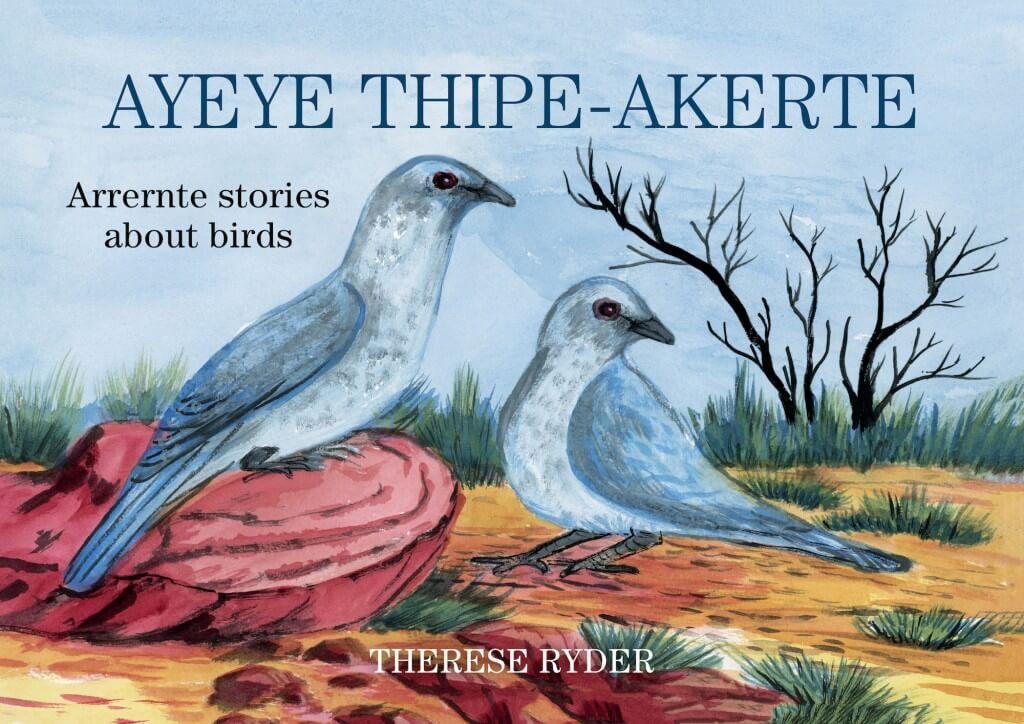

“Iwenhenge the pipe nhenhe mpwareke apele, ayenge ampe putyelenge amangkeke. Thipe nhenhe mapeke akaltye-irremele akngerrapate mapele iletyarte awemele – arrpenheme, kere anwerne-kenhe, arrpenhe mape anwerne arlkwentye akngerre kwenye arle.
My reason why I made this book was that I grew up in the bush. I learned about these birds from my elders – about the birds we see as food, and the other birds that are not food for us.”
Therese Ryder
A new book recently published by Batchelor Institute Press and the Centre for Australian Languages and Linguistics (CALL) is shining a light on the birds of Central Australia through the eyes of Eastern Arrernte artist and writer Therese Ryder.
Ayeye Thipe-akerte: Arrernte Stories About Birds has been created by Therese and linguist Margaret Carew through the Arrernte Language Office at Batchelor Institute of Indigenous Tertiary Education in Alice Springs. It combines Therese’s celebrated and beautiful watercolour paintings featuring birds from Central Australia with Arrernte names and short stories about their appearance, habits and cultural meaning.
It has also been published with a companion app, available in iTunes and Google Play. This allows readers to hear the sounds of the birds, their Arrernte names and stories.
Therese speaks and writes her stories in the Arrernte language, sharing her appreciation for her country, the birds that reside there and their songs. She also explains the roles that they play as messengers and as food.
Therese was born at Todd River station and spent her early childhood living in the bush on Eastern Arrernte country. She travelled around from place to place with her parents and extended family, hunting for food and holding traditional ceremonies on country. Her father was Jack Ryder and her mother Nancy Ryder. Therese’s father’s country is Love’s Creek and Ndhala Gorge, Trephina Gorge, Corroboree Rock and Williams Well. The Arrernte name for this country is Pwanye. Therese’s mother’s traditional country is Titjikala, and she was born at the old Maryvale station. When she was ten years old, Jack and Nancy took her to Santa Teresa Mission, where she went to school. It was there that she learned not only how to read and write, but to paint.
When she grew older she began painting landscapes, not knowing that Albert Namatjira was a great landscape artist. Later on Therese discovered that Albert was a distant uncle to her mother. Alongside her artistic career, Therese has worked in Indigenous education as an Arrernte teacher and on many language projects, including the Eastern and Central Arrernte Dictionary. Today she continues to use her language skills, working as a consultant and advisor to a range of Arrernte literacy, translation, arts and educational projects.
The Centre for Australian Languages and Linguistics (CALL) is a language centre based in the Division of Higher Education and Research at Batchelor Institute. CALL provides a service to community teams, supporting their work on language projects. This work includes language recording and documentation, publication, training, research, and resource development for language learning.
Batchelor Press is the publishing arm of Batchelor Institute. The teaching and learning resources developed at Batchelor Institute are produced primarily for Indigenous Australian students living in remote communities, the majority of whom have English as a second or third language.
